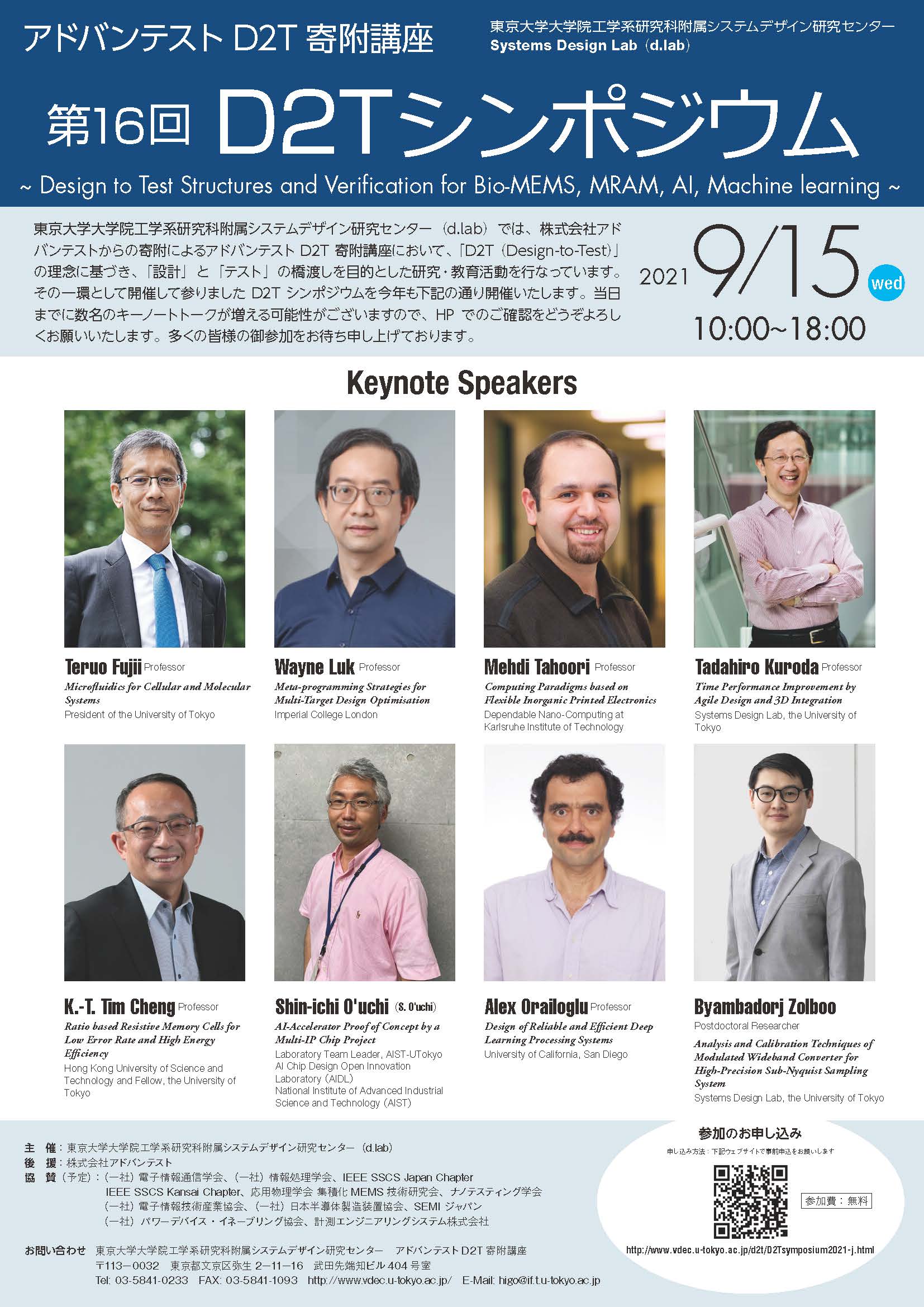The 16th D2T Symposium, The University of Tokyo
September 15th (Wed.), 2021
Virtual Conference @ Zoom
News:
- Symposium homepage was opened. (2021/7/16)
- Registration started. (2021/7/30)
- The seminar is closed. (2021/9/15)
Symposium Overview

From the organizer:
"D2T Symposium" will be held on 15th September, 2021, as
16th meeting of symposium series first started in 2008.
We have been pursuing in "design", "test", and their bridging technologies
in the symposia as indicated in the name "D2T" that means "Design to Test".
This year, we will invite lecturers overseas, Professor Wayne Luk from Imperial College London, Professor Mehdi Tahoori from Dependable Nano-Computing at Karlsruhe Institute of Technology, Professor Alex Orailoglu from University of California, San Diego,
Professor and U-Tokyo fellow, K.-T. Tim Cheng from Hong Kong University of Science and Technology, Dr. Shin-ichi O'uchi (S. O'uchi) from AIST-UTokyo AI Chip Design Open Innovation Laboratory (AIDL), National Institute of Advanced Industrial Science and Technology (AIST)
Professor Tadahiro Kuroda from d.lab, the University of Tokyo and Professor Teruo Fujii, Director, The University of Tokyo, for their distinguished research topics.
We look forward to all of your participation in the symposium.
Time table (日本語版, Japanese version)
10:00 |
Opening remarks |
Tadahiro Kuroda, Director, d.lab, school of Engineering, the University of Tokyo
|
|
10:15 - 11:55 |
Session 1 - Special Lecture I
|
"Microfluidics for Cellular and Molecular Systems"
|
|
10 min break |
|
"Meta-programming Strategies for Multi-Target Design Optimisation"
|
|
11:55 - 13:00 |
Lunch Break |
>
13:00 - 14:30 |
Sesson 2 - Sepecial Lecture II
|
"Time Performance Improvement by Agile Design and 3D Integration"
|
|
"Design of Reliable and Efficient Deep Learning Processing Systems"
|
|
14:30 - 14:45 |
15 min break |
14:45 - 16:15 |
Session 3 - Special Lecture III
|
"Ratio based Resistive Memory Cells for Low Error Rate and High Energy Efficiency"
|
|
"AI-Accelerator Proof of Concept by a Multi-IP Chip Project"
|
|
16:15 - 16:30 |
15 min break |
16:30 - |
Sesson 4 - Activities of D2T Research Department and Special Lecture IV
|
"Activities of D2T research department"
|
|
"Analysis and Calibration Techniques of Modulated Wideband Converter
for High-Precision Sub-Nyquist Sampling System"
|
|
"Computing Paradigms based on Flexible Inorganic Printed Electronics"
|
|
Closing
|
Symposium abstract (日本語版, Japanese version)
"Microfluidics for Cellular and Molecular Systems"
|
"Meta-programming Strategies for Multi-Target Design Optimisation"
|
"Time Performance Improvement by Agile Design and 3D Integration"
|
"Ratio based Resistive Memory Cells for Low Error Rate and High Energy Efficiency"
|
"AI-Accelerator Proof of Concept by a Multi-IP Chip Project"
|
"Computing Paradigms based on Flexible Inorganic Printed Electronics"
|
"Design of Reliable and Efficient Deep Learning Processing Systems"
|
"Analysis and Calibration Techniques of Modulated Wideband Converter
for High-Precision Sub-Nyquist Sampling System"
|
"Activities of Advantest D2T Research Department"
|
Registration (free of charge)
D2T Symposium history
Contact
ADVANTEST D2T Research Department,
Sysmtems Design Lab (d.lab), School of Engineering, The University of Tokyo
Room 404, Takeda Building,
Yayoi 2-11-16, Bunkyo-ku, Tokyo, 113-0032, Japan
Tel: +81-3-5841-0233 FAX: +81-3-5841-1093
E-mail: higo[at]if.t.u-tokyo.ac.jp
Systems Design Lab. (d.lab), School of Engineering, The University of Tokyo